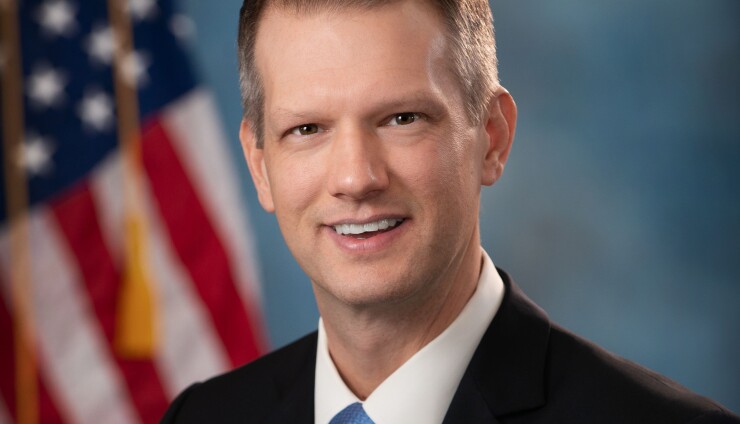West Virginia's Treasurer Riley Moore on Thursday placed five companies on a state-mandated list of restricted financial institutions which he has deemed engage in a “boycott of energy companies.”
The

“While the environmental, social and governance or ESG movement might be politically popular in California or in New York, financial institutions need to understand their practices are hurting people across West Virginia,” Moore said in a statement emailed to The Bond Buyer.
Under West Virginia law, the
In choosing a firm to enter into a state banking contract, the treasurer can:
- disqualify a restricted financial institution from the competitive bidding process or from any other official selection process;
- refuse to enter into a banking contract with a restricted financial institution based on its restricted status; and
- require, as a term of any banking contract, an agreement by the financial institution not to engage in boycott of energy companies for the duration of the contract.
"They have weaponized our tax dollars against the very people and industries that created them,” Moore told the Bond Buyer Thursday. “We are not going to pay for our own destruction. We have a clear conflict of interest in having financial institutions handling tax dollars generated from the fossil fuel industries, while at the same time trying to diminish those dollars."
The treasurer can remove a bank from the list if it demonstrates “it has ceased all activity that boycotts energy companies,” under West Virginia law.
Initially, six financial institutions were flagged; however, U.S. Bank was not placed on the final list after anti-coal mining activities were eliminated from its ESG policies.
In an interview with The Bond Buyer last month, Moore said his office sent notices to the six financial institutions informing them they could be placed on the list after his office made an initial determination the institutions appear to be engaged in boycotts of fossil fuel companies.
"Under the disguise of ESG, environmental activists are leveraging big financial firms like BlackRock to dismantle America’s energy industries,” said Derek Kreifels, CEO of the State Financial Officers Foundation. “Treasurer Moore has been a leader in fighting for his state. It should not go unnoticed that through Treasurer Moore’s actions, U.S. Bank stepped up and did what was right for the people of West Virginia.”
Moore said it was his responsibility to act now.
“I simply cannot stand by and allow financial institutions working against West Virginia’s critical industries to profit off the very funds their policies attempt to diminish,” he said.
This was not the first time firms have been targeted in West Virginia over ESG policies.
“At the beginning of this year, I dropped
In January, the Board of Treasury Investments, which manages the state’s roughly $8 billion of operating funds, said it would no longer use a BlackRock investment fund as part of its banking transactions. That decision was based on reports BlackRock urged firms to embrace “net zero” investment strategies while increasing investments in Chinese companies.
"We want banks to act like banks, asset managers to act like asset managers — and stay out of politics, which is what they've decided to get into with this ESG nonsense," Moore told The Bond Buyer last month.
West Virginia is not alone in fighting against what it sees as overreach in the ESG sector by private firms.
On Wednesday, Florida Gov. Ron DeSantis took aim at ESG and what he terms the "
He announced administrative actions and legislative proposals that are aimed at “protecting residents from the environmental, social, and corporate governance movement.”
The proposals would prohibit fund managers at the State Board of Administration from considering ESG factors when investing the state’s money and require them to only consider maximizing return on investment.
DeSantis also said he will work with like-minded state officials to leverage the investment power of state pension funds through shareholder advocacy to ensure corporations are focused on maximizing shareholder value, rather than the proliferation of what he calls woke ideology.





